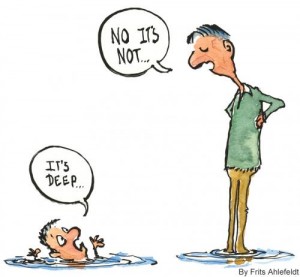 How many times have you thought about the sales call from your client’s perspective? Have you given much consideration to what they see, what they hear, what they want, and what they are feeling? I have so many sales conversations lately where I am convinced that sales professionals are so caught up in their agenda — their process, their pitch, their objectives — that they are not really aware of what the customer sees, thinks, or feels.
How many times have you thought about the sales call from your client’s perspective? Have you given much consideration to what they see, what they hear, what they want, and what they are feeling? I have so many sales conversations lately where I am convinced that sales professionals are so caught up in their agenda — their process, their pitch, their objectives — that they are not really aware of what the customer sees, thinks, or feels.
I am most passionate that everything we do in a sales call requires us to be in tune to the client and what is going on in their world. Until you understand their perspective, from where they sit, you are not connected to them in a way that enables you to help them. Here are some simple thoughts for your consideration on your next sales call:
- Professionalism: What does the client see when he looks at me in a sales call? Am I organized, professional, engaged, poised, and listening?
- Awareness: Is the client comfortable? Does he look at ease and communicating easily? Or, am I the only excited one here?
- Discovery: I would love to talk with him about my services; however, has he expressed a real interest in it? Have I learned enough to share some ideas and experiences? Does he trust me yet?
- Communication: Who’s doing the talking? Am I the one making conversation here? Why isn’t he saying much? What am I missing?
- Preferences: What does he think we need to do next? What are his most desirable follow-up methods? How does he like to be communicated with?
When you start to think about the client in the sales meeting, you have the ability to make the meeting about them. After all, the meeting is all about them. You cannot possibly provide them with something they want or need for their business until you learn from them what that is. You cannot learn from them what that is until you focus your efforts on understanding their world from their perspective. You cannot understand their perspective until you put an emphasis on discovering it.
On your next sales call remember — you may have an objective, a process, and an agenda; none of it matters until you understand and view the world from your client’ perspective.
